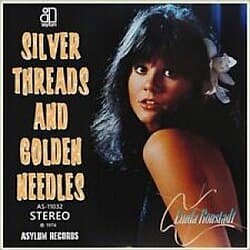
A Woman’s Voice of Defiance Draped in Velvet and Steel
When Linda Ronstadt recorded “Silver Threads and Golden Needles” for her 1973 breakthrough album Don’t Cry Now, she was not merely revisiting a song from country music’s past—she was reclaiming it. Originally a 1956 hit for Wanda Jackson and later covered by The Springfields (featuring a young Dusty Springfield), the song had already earned its place in the country-pop canon. But when Ronstadt’s version climbed the Billboard Hot 100 and found its home on both country and adult contemporary charts, it carried with it a new fire—a confident woman’s refusal to trade love for luxury, sung with the unmistakable ache of someone who had seen both sides of heartbreak.
At the heart of “Silver Threads and Golden Needles” lies a timeless paradox: tenderness fused with rebellion. The lyrics tell of a woman who will not be bought—“Silver threads and golden needles cannot mend this heart of mine.” It is a declaration of independence disguised as a heartbreak ballad, and in Ronstadt’s hands, it became a quiet manifesto. Her voice, both satin and storm, gave the song a human texture that earlier versions lacked. There’s a pleading vulnerability in her phrasing, but also the unmistakable strength of someone standing tall amid emotional wreckage. It was, in essence, the sound of country music growing up—and of a woman taking full command of her voice and narrative.
Musically, Ronstadt’s rendition is a masterclass in balance. The arrangement retains the rootsy integrity of its Nashville origins but infuses it with California’s breezy warmth and the crisp polish of early 1970s country-rock. The harmonies shimmer with that distinct Laurel Canyon glow, and the instrumentation—steel guitar winding like smoke through the mix—echoes her close collaborations with members of the Eagles, who at the time were finding their own sound. Every note feels lived-in, every chorus both a cry and a confession.
What makes this performance endure is not merely its melody, nor its historical place in Ronstadt’s ascent, but its emotional truth. In a decade when women in popular music were expected to either conform or seduce, Ronstadt did neither—she sang as if she had nothing left to prove. “Silver Threads and Golden Needles” became her subtle anthem of autonomy, signaling the artist she was becoming: fearless, genre-defying, and emotionally unguarded.
Half a century later, the song still shimmers—not as a relic, but as a reminder. It tells us that no matter how fine the trappings of love or fame, the heart remains the only treasure that can’t be bought. And in that realization, Linda Ronstadt found her truth—and gave it a voice that time itself could never tarnish.